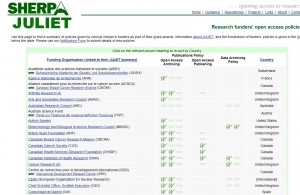 The Senate R&E Committee has approved plans for a BU Open Access Publishing Fund. The fund is due to be launched in August 2011 and will be managed by the Pro-Vice-Chancellor (Research, Enterprise and Internationalisation) and the Research Development Unit. But what is the BU Open Access Publishing Fund and why is this such a big dea for Research at BU?
The Senate R&E Committee has approved plans for a BU Open Access Publishing Fund. The fund is due to be launched in August 2011 and will be managed by the Pro-Vice-Chancellor (Research, Enterprise and Internationalisation) and the Research Development Unit. But what is the BU Open Access Publishing Fund and why is this such a big dea for Research at BU?
What is open access publishing? Open access publishing turns the traditional publishing route (readers paying subscriptions to publishers) on its head as researchers pay a fee to the publisher to publish their research and in turn the publisher makes the article available free of charge to readers immediately on publication.
Why is this beneficial? Open access publishing enables research findings to be disseminated to a wider public audience, typically with significantly faster publication times, than traditional journal publishing. The European Commission’s policy on open access publishing notes that the broad dissemination of research findings can accelerate scientific progress and has significant benefits to both the scientific community and to society.
What is the view of research funding bodies? Many funders require the research they fund to be made freely available, free of charge to any readers upon completion of the project. A full list of funders with open access requirements can be found on the Sherpa Juliet website, and includes all seven Research Councils, the European Commission, the Wellcome Trust and the National Institute for Health Research (NIHR). These requirements have been put in place by funders to maximise the public dissemination of research findings. However, despite these open access mandates funders are reporting that researchers and therefore HEIs are not compliant; recent research undertaken by the Wellcome Trust indicates a compliance rate of less than 50%. An institutional open access publishing fund can increase compliance rates with funding body open access requirements.
How will this help our submission to the REF? Open access publishing has three potentially significant benefits for BU’s submission to the Research Excellence Framework in 2013:
- Publication times – Papers can be published significantly faster than traditional journal publishing methods and therefore BU would not be as constrained by traditional publishing deadlines; more articles could therefore be published prior to the REF publication deadline and be eligible for submission.
- Citations – Open access publications are more widely available and are therefore more likely to be cited.
- Research impact – Open access publication is a way of enhancing the visibility and increasing the impact of research findings. Research findings made freely available to society at large are likely to have wider societal impact.
Do other institutions have open access funds? A number of international research institutions have already established institutional budgets and processes for open access publishing, such as the Max Planck Society’s Central Open Access Fund and the University of California Berkeley’s Research Impact Initiative. In the UK the University of Nottingham has led the way by establishing an institutional open access publishing fund.
How can open access costs be met? A number of funding bodies (such as the Research Councils and the Wellcome Trust) allow researchers to include open access publication costs as a directly incurred cost providing that the costs are included in the original costing and are incurred prior to the end of the grant. For all other open access publishing costs, researchers will be able to apply to the new BU Open Access Publishing Fund. Requests to the fund will need to be made to the Research Development Unit and will then need to be approved by the Pro-Vice-Chancellor (Research, Enterprise and Internationalisation) and the relevant REF UOA Leader.
When will further details be announced? We are currently working on a policy, process and communication plan and further announcements will be made via the blog before August 2011.
What about any open access requests between now and the end of July 2011? If you have any open access publishing requests before the BU Open Access Publishing Fund is launched in August 2011, please discuss these with your Deputy Dean (R&E) / equivalent and Julie Northam. Where requests are justifiable (i.e. high quality open access outlet, likely to be submitted to the REF, likely to increase the impact of the research findings, etc) then we will endeavour to accommodate these within the CRE budget where possible.
For further information on open access publishing the Research Information Network published a guide to Paying for Open Access Publication Charges in February 2011.
Also see the Public Library of Science (PLoS) website.
 Then come to our free Open Access event this Wednesday in the EBC!
Then come to our free Open Access event this Wednesday in the EBC!
 A new book ‘
A new book ‘














 BU attendance at third annual GCPHR meeting in June
BU attendance at third annual GCPHR meeting in June Interactive Tangible and Intangible Heritage Applications – BU student work featured in new book chapter
Interactive Tangible and Intangible Heritage Applications – BU student work featured in new book chapter Second NIHR MIHERC meeting in Bournemouth this week
Second NIHR MIHERC meeting in Bournemouth this week MSCA Postdoctoral Fellowships 2025 Call
MSCA Postdoctoral Fellowships 2025 Call ERC Advanced Grant 2025 Webinar
ERC Advanced Grant 2025 Webinar Horizon Europe Work Programme 2025 Published
Horizon Europe Work Programme 2025 Published Horizon Europe 2025 Work Programme pre-Published
Horizon Europe 2025 Work Programme pre-Published Update on UKRO services
Update on UKRO services European research project exploring use of ‘virtual twins’ to better manage metabolic associated fatty liver disease
European research project exploring use of ‘virtual twins’ to better manage metabolic associated fatty liver disease